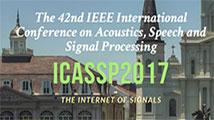
ICASSP is the world's largest and most comprehensive technical conference on signal processing and its applications. It provides a fantastic networking opportunity for like-minded professionals from around the world. ICASSP 2017 conference will feature world-class presentations by internationally renowned speakers and cutting-edge session topics. Visit ICASSP 2017
- Read more about Probabilistic Analysis of Tone Reservation Method for the PAPR Reduction of OFDM Systems
- Log in to post comments
High peak values of transmission signals in wireless communication systems lead to wasteful energy consumption and degradation of several transmission performances. We continue the theoretical contributions made by Boche and Farell towards the understanding of peak value reduction, using the strategy known as tone reservation for orthogonal transmission schemes. There it was shown that for OFDM systems, the combinatorial object called arithmetic progression plays an important role in setting limitations for the applicability of the tone reservation method.
- Categories:
 13 Views
13 Views- Read more about CLASSIFICATION OF UNDERWATER PIPELINE EVENTS USING DEEP CONVOLUTIONAL NEURAL NETWORKS
- Log in to post comments
Automatic inspection of underwater pipelines has been a task of growing importance for the detection of a variety of events, which include inner coating exposure and presence of algae. Such inspections might benefit of machine learning techniques in order to accurately classify such occurrences. This article describes a deep convolutional neural network algorithm for the classification of underwater pipeline events. The neural network architecture and parameters that result in optimal classifier performance are selected.
- Categories:
 35 Views
35 Views- Read more about PHASE ESTIMATION IN SINGLE-CHANNEL SPEECH ENHANCEMENT USING PHASE INVARIANCE CONSTRAINTS
- Log in to post comments
Phase-aware signal processing has received increasing interest
in many speech applications. The success of phase-aware
processing depends strongly on the robustness of the clean
spectral phase estimates to be obtained from a noisy observation.
In this paper, we propose a novel harmonic phase estimator
relying on the phase invariance property exploiting
relations between harmonics using the phase structure. We
present speech quality results achieved in speech enhancement
to justify the effectiveness of the proposed phase estimator
ICASSP2017.pdf
- Categories:
 14 Views
14 Views- Read more about ROBUST AUTOMATIC RECOGNITION OF SPEECH WITH BACKGROUND MUSIC
- Log in to post comments
This paper addresses the task of Automatic Speech Recognition (ASR) with music in the background, where the accuracy of recognition may deteriorate significantly.
To improve the robustness of ASR in this task, e.g. for broadcast news transcription or subtitles creation, we adopt two approaches:
1) multi-condition training of the acoustic models and 2) denoising autoencoders followed by acoustic model training on the preprocessed data.
In the latter case, two types of autoencoders are considered: the fully connected and the convolutional network.
- Categories:
 13 Views
13 Views- Categories:
 95 Views
95 Views- Read more about SEQUENCE SEGMENTATION USING JOINT RNN AND STRUCTURED PREDICTION MODELS
- Log in to post comments
icassp2017.pdf
- Categories:
 11 Views
11 Views- Read more about Stereo image de-fencing using smartphones
- Log in to post comments
- Categories:
 12 Views
12 Views- Read more about Combining Belief Propagation and Successive Cancellation List Decoding of Polar Codes on a GPU Platform
- Log in to post comments
The decoding performance of polar codes strongly depends on the decoding algorithm used, while also the decoder throughput and its latency mainly depend on the decoding algorithm. In this work, we implement the powerful successive cancellation list (SCL) decoder on a GPU and identify the bottlenecks of this algorithm with respect to parallel computing and its difficulties. The inherent serial decoding property of the SCL algorithm naturally limits the achievable speed-up gains on GPUs when compared to CPU implementations.
- Categories:
 11 Views
11 Views- Read more about Deductive Refinement of Species Labelling in Weakly Labelled Birdsong Recordings
- Log in to post comments
Many approaches have been used in bird species classification from their sound in order to provide labels for the whole of a recording. However, a more precise classification of each bird vocalization would be of great importance to the use and management of sound archives and bird monitoring. In this work, we introduce a technique that using a two step process can first automatically detect all bird vocalizations and then, with the use of ‘weakly’ labelled recordings, classify them.
- Categories:
 10 Views
10 Views